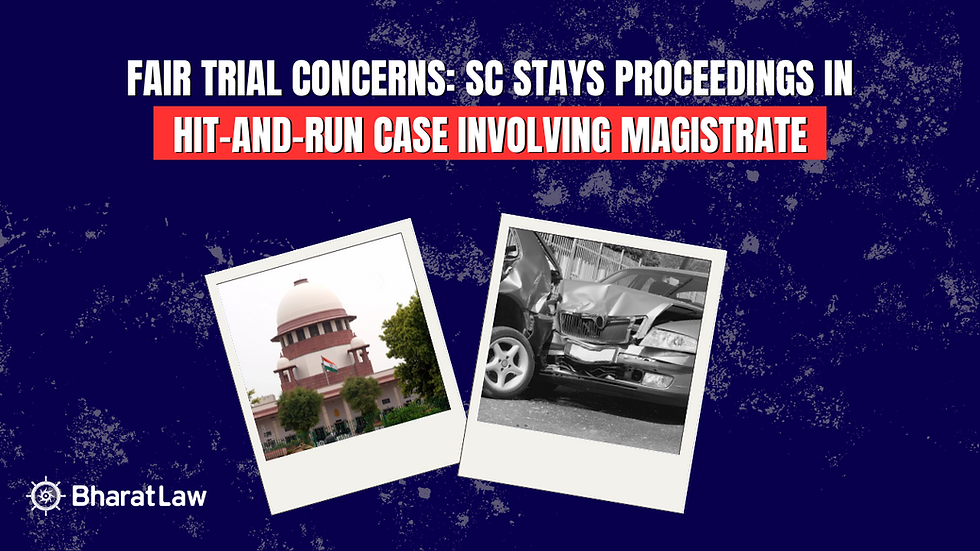Public Demand Means Any Arrear Mentioned in Schedule I– Supreme Court Clarifies Recovery Under Public Demands Recovery Act
- Chintan Shah

- Dec 19, 2024
- 3 min read
Summary of the Judgement
Case Name: Pawapuri Rice Mills v. Bihar State Food and Civil Supplies Corporation Ltd. & Ors.
Date of Judgment: 18 December 2024
Judges: Hon’ble Justice Hrishikesh Roy and Hon’ble Justice S.V.N. Bhatti
Advocates: Shri Navneeti Prasad Singh and Shri Amit Sibal (for Rice Millers), Shri Manish Kumar (for the Civil Supplies Corporation)
Acts and Sections Cited: Bihar and Orissa Public Demands Recovery Act, 1914; Bihar and Orissa Public Demands Recovery Rules, 1914; Sections 3(6), 43, 44, 60, 62, and 63
Cited Judgements: Ram Chandra Singh v. State of Bihar, (1986) SCC OnLine Pat 229; Arun Kumar v. Union of India, (2007) 1 SCC 732; Ramesh Chandra Sankala v. Vikram Cement, (2008) 14 SCC 58
Introduction
This judgment delves into the legal intricacies of defining "public demand" under the Bihar and Orissa Public Demands Recovery Act, 1914. The case primarily revolves around disputes between Rice Millers in Bihar and the Civil Supplies Corporation over the non-delivery of Custom Milled Rice (CMR) during the 2011–12 procurement season. The Supreme Court upheld the Division Bench's ruling, allowing recovery proceedings against the Rice Millers.
Key Issues
The Supreme Court identified the following pivotal issues:
Definition of Public Demand: Whether the dues owed to the Civil Supplies Corporation qualified as "public demand" under Section 3(6) and Clause 8-A of Schedule I of the Act.
Role of Civil Supplies Corporation: Whether it acted as a nodal agency of the State and thus had the authority to recover dues under the Act.
Procedural Safeguards: Examination of procedural adherence and the principles of natural justice in recovery proceedings.
Court’s Observations
Definition of Public Demand
The Court highlighted the expansive scope of "public demand" under Section 3(6) of the Act, which includes arrears explicitly mentioned in Schedule I. Clause 8-A of Schedule I further extends this definition to include loans or advances owed to the State Government, its departments, or officials.
The Bench referred to Ram Chandra Singh v. State of Bihar, which held that “public demand” is a concept of wide amplitude and can encompass any arrear or dues specified in Schedule I. The judgement states:
“The deliberate legislative design of Section 3(6) and Schedule I reinforces the inclusive scope of the term.”
The Civil Supplies Corporation, acting as the State’s nodal agency, had provided paddy to the Rice Millers for custom milling under a contractual arrangement. The Court determined that the cost of undelivered CMR constituted a public demand recoverable under the Act.
Role of the Civil Supplies Corporation
The Court affirmed the status of the Civil Supplies Corporation as a nodal agency implementing State policy. The Corporation was entrusted with procuring paddy from farmers and facilitating its milling into CMR by Rice Millers, which was then distributed through the Public Distribution System (PDS).
The judgment clarified:
“The Civil Supplies Corporation, as the nodal agency of the State Government, was acting on behalf of the State to ensure the smooth functioning of the PDS.”
Procedural Safeguards
While the Rice Millers alleged procedural lapses, the Court found that the recovery proceedings adhered to the Act’s framework. Sections 43, 44, 60, 62, and 63 provide mechanisms for appeal, revision, and review, ensuring adequate safeguards.
The Court emphasised:
“The Act is a comprehensive and codified enactment that provides adequate safeguards for parties facing recovery actions.”
Significance of the Judgement
This decision is pivotal for two reasons:
Legal Precedent on Public Demand: It establishes a broad interpretation of "public demand," enabling efficient recovery of dues linked to public welfare schemes.
Balancing State and Private Interests: By affirming the Civil Supplies Corporation's role as a nodal agency, the judgement underscores the importance of State-backed initiatives in public interest.
Implications
Legal practitioners should note the Court’s reliance on jurisdictional facts to validate recovery proceedings. The judgment reaffirms the principle that the absence of explicit clauses in agreements does not negate statutory remedies provided under special laws like the Public Demands Recovery Act.
Moreover, it highlights the necessity for parties to exhaust statutory remedies before invoking writ jurisdiction.
Conclusion
The Supreme Court’s ruling in Pawapuri Rice Mills v. Bihar State Food and Civil Supplies Corporation Ltd. reinforces the legal and procedural framework for recovering public dues. By balancing statutory interpretation with public interest, the Court has set a significant precedent for future cases involving public demands and contractual obligations.
As Hon’ble Justice S.V.N. Bhatti noted:
“Jurisdictional facts consist of a sequence of events or a bundle of circumstances... they determine the very validity of the proceedings.”
This judgement not only clarifies the expansive scope of "public demand" but also strengthens the State’s ability to enforce public welfare policies through statutory mechanisms.



Comments